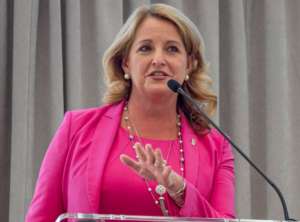
EEOC, USDA loaned $12 million to move off paper-based processes
Federal CIO Suzette Kent said the first agency paid back money to the Technology Modernization Fund and several others returned money after reconfiguring its plans.
PHILADELPHIA–The Technology Modernization Fund Board loaned out another $12 million to two agencies to accelerate IT projects.
The Equal Employment Opportunity Commission is slated to receive $4 million to modernize its case management system. The Agriculture Department earned its third TMF award. This one was for $8 million to help move the Agricultural Marketing Service’s Specialty Crops Program off an approach that relies on triplicate carbon paper.
But the bigger accomplishment in this programmatic update from the TMB board may have come from two existing projects.
“The projects are on track, we actually got some of our first money back, which is a great thing,” said Suzette Kent, the federal chief information officer, in an interview with Federal News Network at the ImagineNation ELC 2019 conference, sponsored by ACT-IAC. “Each of them has a spend plan. That is something that we share with Congress. So you know, when money goes out, and when we expect money to come back in and what that looks like.”

Kent didn’t say which agency paid some of the money back, and the TMF website didn’t offer any details. Agencies have five years to payback the loan under the rules of the program.
Additionally, USDA and the Energy Department updated their progress plans and decided to return money to the board.
“There have been some adjustments you’re actually going to see posted on the website. We actually had one project at the Department of Energy that during the shutdown had some of the labs proceed with the initiative, and they did that through some of their own funds. So Energy is actually going to reduce some of what they originally asked for,” Kent said. “So you’re going to see some of those type of adjustments, which I’m excited about because that shows a healthy management of the funds, yet we’re still meeting the overall sets of objectives. So all of that, both what those adjustments are and the new awards are going to be posted.”
Energy initially was slated to receive $15.2 million to migrate 64 separate email systems to the cloud, but now only will need $5.9 million.
“[S]everal DOE components moved forward with migration efforts using internal funding identified following the TMF award while DOE worked through a bid protest of the IT support services contract to be used for the larger migration effort, which was successfully adjudicated in favor of the department,” the board states. “Without this funding, DOE would need to conduct the migration of the remaining systems using a piecemeal approach subject to fund availability. However, with support from the TMF the project can be conducted as a single effort and can be completed in three years.”
USDA reduced loan to $500,000 from $5 million
USDA initially expected to receive $5 million to migrate 10 applications to the cloud, but decided it only needed $500,000 to complete the migration of the Emergency Watershed Protection application in the Farm Production and Conservation portfolio.
“[T]he Food and Nutrition Service moved forward with migration efforts for five of the identified applications using internal funding identified following the TMF award. USDA also identified that a revised analysis conducted as part of the agile project management approach determined that four of the remaining proposed applications would not generate the return on investment necessary to repay the TMF through project savings,” the TMF board states. “USDA reviewed its remaining application portfolio and determined that further evaluation at the agency level would be required before replacement applications could be identified and made the decision to reduce its requested TMF allocation so as not to tie up the limited TMF resources during their reevaluation process.”
Kent said agencies provide the TMF board progress updates every quarter where they discuss any necessary adjustments. She said the government shutdown impacted some projects more than others causing agencies like Energy and USDA to adjust their plans.
At the same time, the board also is sharing the lessons from each of the projects.
“There are some artifacts that are being produced by some of the projects that are being made available across the CIO Council,” she said. “That was one of the asks from the board for the agencies to share their experiences with other agencies. So whether it’s HUD’s movement from COBAL to JAVA, where they have shared their plan and some of their estimating tools or it was GSA legacy database migration where they created a playbook. Those are the things we are really excited about as those projects make progress.”
The TMF board has about $25 million still to loan out in 2020 as a carryover from 2019. It’s unclear if Congress is allocate new money for fiscal 2020. The House approved $35 million for TMF, while the Senate zeroed out the fund. The Trump administration requested $150 million for this fiscal year.
Kent said the board has so far received 50 applications worth more than $600 million in requested funding.
“The board looks for is a set of criteria that are very consistent. And they’ve been consistent across all the awards that have been made. They meet the objectives that were set out in the law. They have a very clear payback. The agency leadership is committed and involved. And in many cases, they have already committed dollars. And this is, you know, an acceleration, or the team has done a pilot,” Kent said. “So we’ve had a high degree of certainty about what kind of outcome and what’s the expectation.”
Kent said USDA has shown time and again it is meeting these criteria.
“We all know that USDA has made a commitment about extreme modernization from the secretary down and I will just say that just kind of like being at bat, that the number of swings that you take, you’re going to hit some of them and USDA has come to bat many, many times,” she said. “And I would challenge other agencies to do the same. If the board is going to continue to award those worthy projects. We ask repeatedly for more agencies to come, to see more projects, and I would keep that invitation out there and open.”
Copyright © 2025 Federal News Network. All rights reserved. This website is not intended for users located within the European Economic Area.
Jason Miller is executive editor of Federal News Network and directs news coverage on the people, policy and programs of the federal government.
Follow @jmillerWFED





